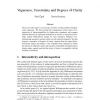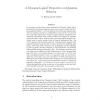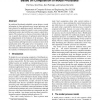39 search results - page 5 / 8 » Epistemic modals and informational consequence |
SYNTHESE
2010
13 years 7 months ago
2010
The focus of the paper is on the logic of clarity and the problem of higherorder vagueness. We first examine the consequences of the notion of intransitivity of indiscriminabilit...
SLOGICA
2008
13 years 8 months ago
2008
In this paper we show how recent concepts from Dynamic Logic, and in particular from Dynamic Epistemic logic, can be used to model and interpret quantum behavior. Our main thesis ...
ICCAD
1998
IEEE
14 years 25 days ago
1998
IEEE
In traditional distributed embedded system designs, control information is often replicated across several processes and kept coherent by application-specific mechanisms. Conseque...
ACL
1992
13 years 9 months ago
1992
The information state of an agent is changed when a text (in natural language) is processed. The meaning of a text can be taken to be this information state change potential. The ...
CORR
2011
Springer
13 years 3 days ago
2011
Springer
We propose a new definition of the representation theorem for many-valued logics, with modal operators as well, and define the stronger relationship between algebraic models of ...



